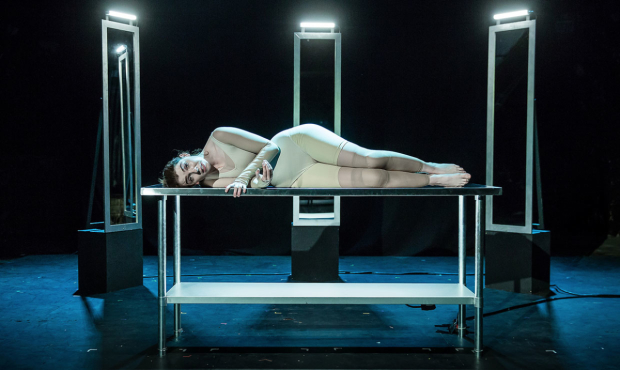Edinburgh review: Dust (Underbelly Cowgate)
Milly Thomas’s new Edinburgh Fringe play sees the writer-actor deliver a powerful performance

© The Other Richard
Alice awakes with a jolt; her body laid out on a mortuary slab. She hovers over herself, watching rigor mortis set in, and offers apologies to her corpse – for filling it up with booze, for not using protection, for not taking care. She has, you slowly realise, taken her own life, only to find herself stuck in limbo; a ghost hanging around her old haunts. Alive, Alice had a death wish. Dead, she longs for life.
Dust is a wrenching portrait of a deep-set depression – but one laced with a dry, detached sense of humour as Alice watches the world turn without her. She drops in on her parents, grappling with their grief, on her sister mid-shag and on her cheating boyfriend. Sex, the physical act of it, the ins and the outs, recurs, as Milly Thomas talks us through an out-of-body experience for a young woman who never felt at home in hers.
It becomes increasingly apparent that Alice lived her life like a ghost. She haunted Facebook and Instagram, binding her identity up in her virtual presence. Her MacBook and iPhone are like extra limbs, and her memories are of drifting into distraction during sex or detaching from those closest to her – and, indeed, from herself. Only self-harm brings her back into her body; the pain precise and real. It’s only in death that she sees the presence of her absence, watching over her inconsolable mother or her guilt-stricken boyfriend.
Thomas writes with an unflinching honesty, as much in humour as in despair. It’s hard not to draw comparisons with Phoebe Waller-Bridge’s Fleabag – another woman whose apparent self-certainty masks ingrained insecurities – but Dust‘s edges aren’t as sharp, nor its surprises as sprung. Numbness is its issue. Since Alice feels so little, it’s hard for us to either.
It is, however, Thomas’s performance that shines. More than swapping roles, she skips between perspectives on the same set of events. She’s a mother who can’t find the words for her suicidal daughter, and the daughter sat in mournful silence by her side. She’s the unfaithful boyfriend bursting with grief and guilt, and the other woman trying to offer him support and space at the same time. It’s a real feat of empathetic acting and, steered by Sara Joyce’s supple direction, Thomas sees things from all sides. Anna Reid’s clinical design picks that up: a space surrounded by mirrors.
That, perhaps, is her diagnosis of depression: that it so skews our sense of the world and ourselves that it becomes almost impossible to see one’s lot in life. Dust finds a flipside in death.
Dust runs at the Underbelly until 27 August, 4:40pm.















